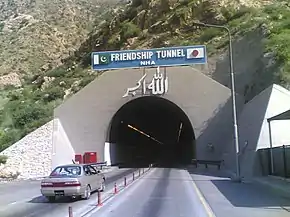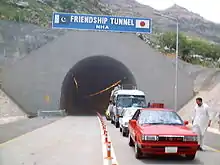Kohat Tunnel
The Kohat Tunnel (Urdu: کوہاٹ سرنگ, Kohat Surang) is a 1.9-kilometre-long (1+1⁄8-mile) highway tunnel under the Khigana Mountains between Kohat District of Khyber Pakhtunkhwa and Frontier Region Kohat in the Federally Administered Tribal Areas of Pakistan. The tunnel carries northbound and southbound traffic along N-55 National Highway (Indus Highway) under the Kohat Pass. The tunnel is also referred to as the Pak-Japan Friendship Tunnel, as the tunnel was constructed in assistance with the Economic Cooperation Fund of Japan.[1]
 The tunnel’s southern entrance | |
| Overview | |
|---|---|
| Location | Khyber Pakhtunkhwa, Pakistan |
| Coordinates | 33°38′51″N 71°32′18″E |
| Route | |
| Crosses | Khigana Mountains |
| Operation | |
| Work begun | 1999 |
| Opened | June 2003 |
| Technical | |
| Design engineer | Sadrul Ola Rizvi (Project Director - Indus Highway NHA) |
| Length | 1.89 km (1+1⁄8 mi) |
| Tunnel clearance | 3 m (9 ft 10 in) |
| Width | 10.3 m (33 ft 10 in) |
History

Construction on the tunnel began in 1999, and opened to traffic in June 2003. As part of the developing Indus Highway system, the tunnel serves as a shorter, alternate route to the Kohat Pass, situated between the cities of Peshawar and Kohat. The new route decreases the time required to travel through the Kotal Pass by about 20 minutes. The main advantage of the tunnel is that long bodied vehicles can now use the Indus Highway whereas previously the hairpin bends on the Kotal Pass made it impossible for such vehicles to travel. It also helps alleviate traffic congestion, improve traffic safety and promote economic development.
The tunnel was at the center of a military confrontation between the Pakistan Army and pro-Taliban militants in early 2008. The militants had taken control of the tunnel around 24 January, after hijacking trucks carrying supplies and ammunition for security forces in South Waziristan. On 27 January, Pakistan Army brought the tunnel back under control of the security forces, after "fierce fighting" involving artillery, helicopter gunships and heavy machine guns during which 24 militants were reported to have been killed.[2][3]
Features and specifications
- Total project cost: Rs. 662.6 million (US$2.3 million)
- Length of north section: 7.7 kilometres
- Length of south section: 22.20 kilometres
- Black topped: 7.3 metres
- Shoulders: 3.0 metres
References
- "Construction of Kohat tunnel". www.pakistaneconomist.com.
- Pak army kills 25 pro-taliban militants, recaptures tunnel-Pakistan-World-The Times of India
- "AFP: Pakistan troops pound militants holding key tunnel: officials". Archived from the original on 20 May 2011. Retrieved 27 January 2008.